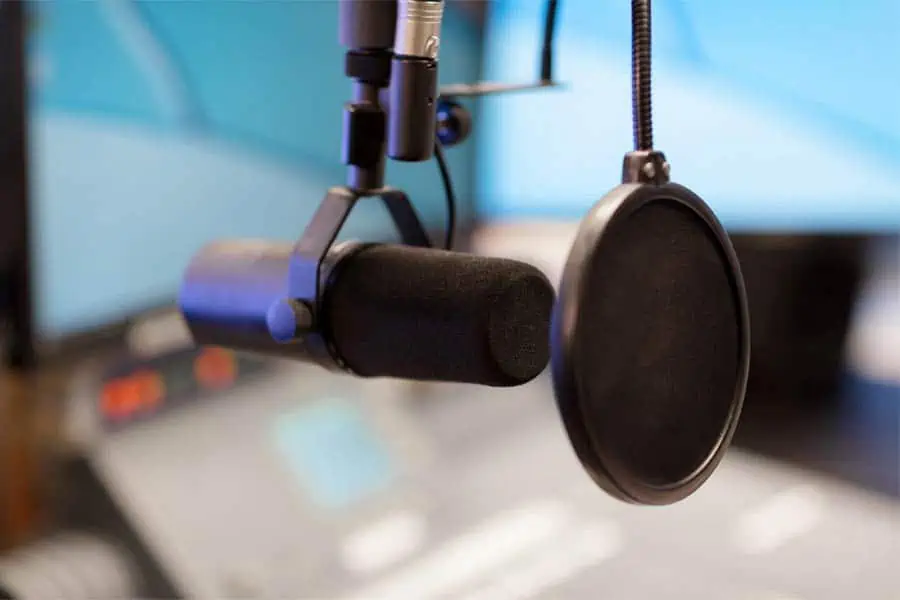DIY Video Studio is supported by its readers who use the affiliate links or ads on this site. As an Amazon Associate, I earn from qualifying purchases. Thank your support if you use any of the links.
If you have been looking at online listings for pop filters in the hope that they will help reduce background noise, I have some disappointing news for you.
Does A Pop Filter Remove Background Noise? No, a Pop filter does not reduce or remove background noise. This is because pop filters should be as acoustically transparent as possible so that the sound of your voice is not affected except for preventing voice pops caused by plosives from words starting with P and B.
If a pop filter were effective at reducing the sound passing through it, and remember, background noise is just another form of sound, then a pop filter would be useless as a pop filter.
Why don’t pop filters reduce background noise?
Pop filters need to do two things. They should reduce voice pops and leave the sound unaffected in any other way. In other words, they should prevent the pops, and do it as invisibly as possible.
The way this is done depends on the design of the pop filter. If we consider a fabric mesh pop filter, the fabric layer diffuses the air blast that would otherwise cause the pop. But the sound wave passes through with its tone and amplitude (the loudness) unaffected. In other words, the fabric layer is acoustically transparent, or at least as acoustically transparent as possible. In practice, some high frequencies are reduced, but typically by only about 1dB or less.
If sound waves from our speech or singing can pass through the pop filter without being affected, so will background noise. This is because background noise, like our speech, is a collection of sound waves.
Why do some people say pop filters can reduce background noise
Some people believe that pop filters can shield a microphone from background noise for a couple of reasons. The first is simply down to the poor translation of Chinese into English. The second is that some related products claim to be able to isolate a microphone from the background.
When it comes to poor translation, we can see this in the advertising copy and product packaging of a metal screen pop filter. I have this pop filter and know that it can reduce voice pops, but I think the online listing is potentially confusing since it states, “you can record freely without worrying about “pops” and noise.” Also, the copy on the product packaging says, “Reduce Noise” and “Noise reduction Pop Filter”.
At first glance, you might think that this product will reduce voice pops and background noise. But in my experience, any blocking of background noise is minimal.
I am not suggesting the manufacturer is trying to mislead buyers. The problem seems to be one of poor translation from Chinese into English. If you have looked at inexpensive audio and video equipment online, you will know what I mean. Nonetheless, I can appreciate that someone might consider a voice pop to be “noise” and therefore the pop filter can have a “noise reduction” effect.
If poor translation is one possible reason why people might think that pop filters might reduce background noise, then what about confusion over related products?
I have seen many adverts for microphone isolation shields, which are sometimes called vocal booths. They are basically a foam enclosure around the microphone. Often the foam is attached to folding metal or plastic panels that can form an arc around the microphone. Not only does the advertising copy claim that it will reduce noise but sometimes it includes the term “pop filter” in the product title. This latter point is where some confusion might occur.
But look at the product images and you will see that many items do not have anything in front of the microphone, which is where you would place a pop filter. And where a fabric pop filter is incorporated into the design, as I explained earlier, it is designed to transmit sound waves and not stop them.
You might also like to watch the video
Summary
If you have a problem with your microphone picking up background noise, it will not be solved by getting a pop filter. A pop filter will only help prevent voice pops, and good ones will have no or minimal effect on the tone or amplitude of the sound.
Tosh Lubek runs an audio and video production business in the UK and has been using the Canon EOS R since it was released in the Autumn of 2018 and the Canon EOS R6 in 2020. He has used both cameras to shoot TV commercials broadcast on Sky TV, promotional business videos, videos of events and functions, and YouTube creator content. He has also won several international awards for his advertising and promotional work. You can meet him by visiting his “video booth” at HashTag Business Events across the country.


